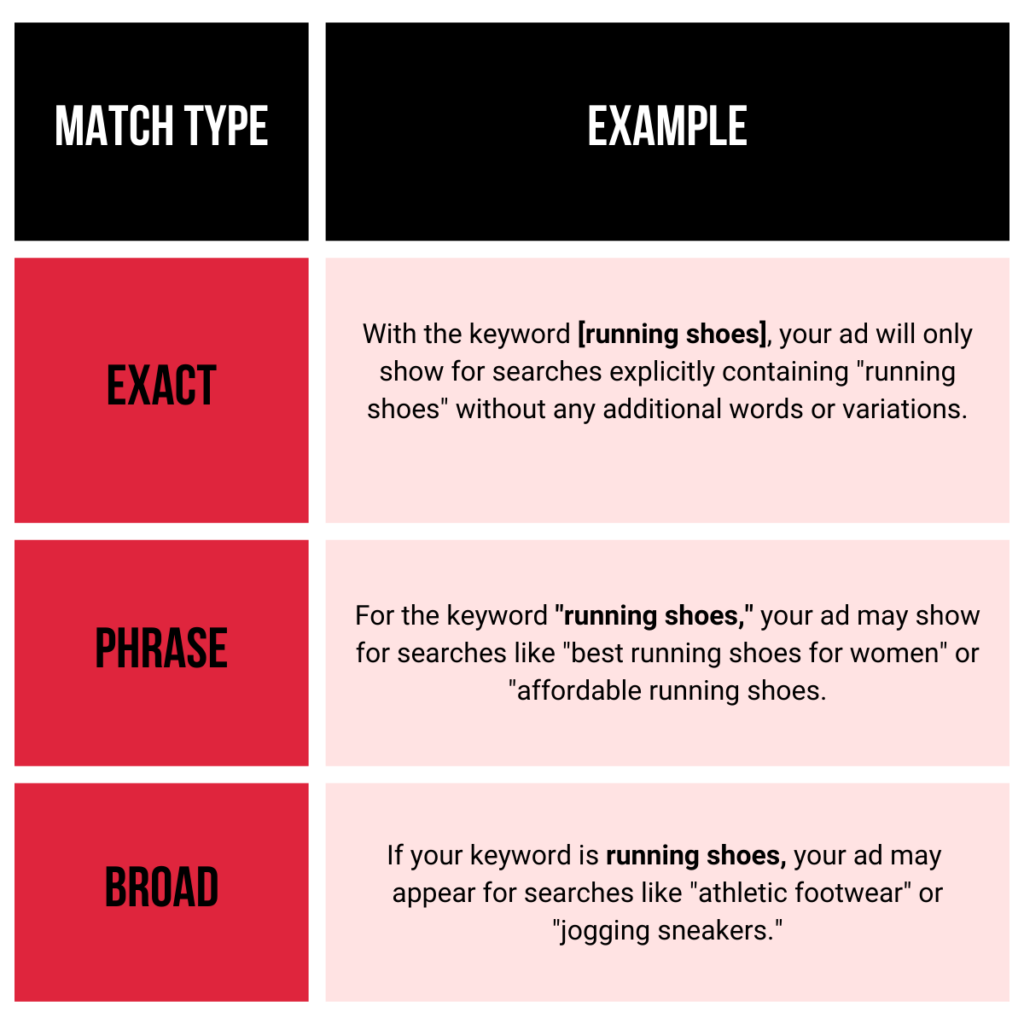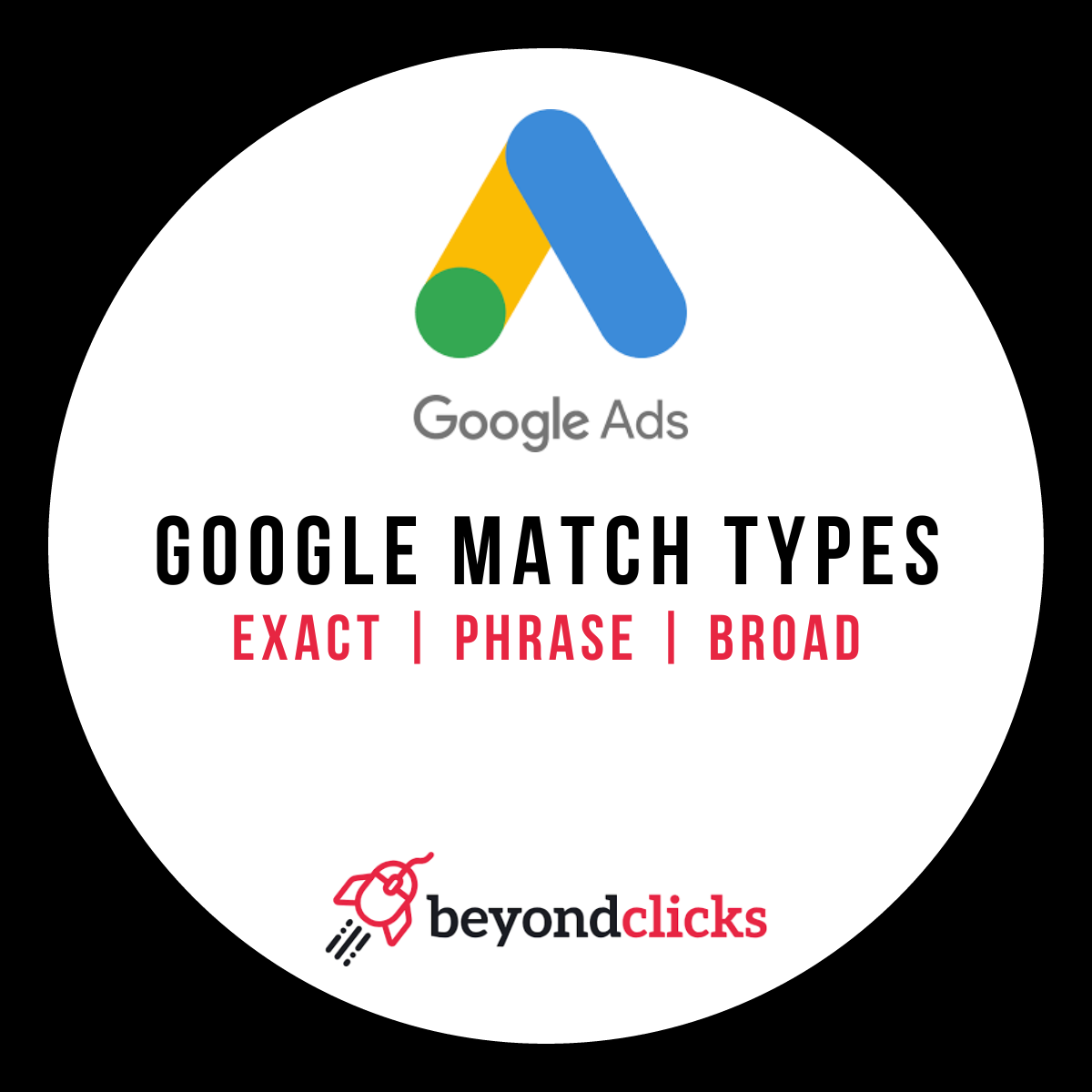Google Keyword Match Types
Whether you’re a seasoned digital marketer looking to refine your keyword strategy or a newcomer eager to grasp the basics, this blog aims to be your comprehensive guide to the world of Broad, Exact and Phrase Match keywords.
Over the years, Google has altered keyword match types to align with the introduction of Performance Max, machine learning and changes in attribution models. The three primary keyword match types are: Broad, Exact and Phrase Match.
You don’t need us to tell you that keywords play a pivotal role in connecting with your target audience. Crafting a successful keyword strategy involves more than just selecting relevant terms; it requires an understanding of the broad, phrase and exact match types.
These are the building blocks of effective keyword targeting, each with unique characteristics, advantages, and drawbacks.
Understanding Broad Match:
Broad match is the most inclusive keyword match type. When you use broad match, your ads may appear for searches that include misspellings, synonyms, related searches, and other variations. While this can cast a wide net and increase visibility, it also poses the risk of irrelevant clicks.
Broad Match Pro’s:
- Increased Visibility: Broad match helps your ads reach a broader audience, maximising exposure.
- Discover New Keywords: It can uncover new and unexpected keyword variations that you may not have considered.
Broad Match Con’s:
- Irrelevant Clicks: Broad reach may lead to clicks from users not genuinely interested in your product or service.
- Limited Control: Advertisers have less control over which specific queries trigger their ads.
Understanding Phrase Match:
Phrase match is more restrictive than broad match but provides a middle ground between broad and exact match types. Your ads will appear for searches that include the exact phrase you specify, along with variations such as additional words before or after.
Phrase Match Pro’s:
- Improved Relevance: Phrase match narrows down the audience, ensuring a higher level of relevance for your ads.
- Increased Control: Advertisers have more control compared to broad match, allowing for a balance between reach and precision.
Phrase Match Con’s:
- Potential Missed Opportunities: It may still capture some irrelevant queries, limiting the precision of targeting.
- Less Flexibility: Advertisers sacrifice some flexibility in exchange for increased relevance.
Understanding Exact Match:
Exact match is the most precise keyword match type. It targets searches that precisely match the keyword or are very close variations. This match type offers the highest level of control and specificity.
Exact Match Pro’s:
- Pinpoint Accuracy: Exact match ensures that your ads are shown only for highly relevant queries.
- Better Budget Control: Advertisers can allocate budgets more efficiently since the targeting is highly specific.
Exact Match Con’s:
- Limited Reach: The precision of exact match may result in fewer impressions and potentially fewer conversions.
- Missed Opportunities: Some relevant searches may be missed if they don’t perfectly match the specified keyword.
Keyword Match Examples:

How do match types affect your search ad results?
Selecting the correct match type is essential as it helps you reach your target audience but also avoids unnecessary spend on irrelevant clicks.
Other components to consider:
- Your Competitors: When competing in auctions, your results will depend on the structure of brands you are appearing in the auction alongside. You can view auction insight data within Google ads to get a steer on other competitors showing in the same auctions.
- Performance Data: Review your campaigns and keyword performance over a period of time (we recommend 30 days) Assessing how many clicks your keywords have had will provide insights into which match type will generate the highest ROI.
- Bids: Manipulating bids can strongly influence which match type is most appropriate. These changes will affect your cost per click and cost per conversion.
- Ad Account Structure: Considering your account structure is key in campaign performance. As a rule, we set campaigns up using exact match keywords to retain initial control and monitor performance (dependent on the client’s objective). If you’re looking to test different keyword match types, our recommendation would be to do this at AdGroup level.
Conclusion:
Google ads is pushing for more and more automation and they are encouraging the use of broad match keywords. However we wouldn’t always recommend this as the best solution when starting ad campaigns. We also have an inkling that Google may retire phrase match completely this year but time will tell! In the meantime, we will continue to expand our knowledge and experience to get the best from your campaigns whilst maintaining control over your budgets.
We can’t stress the importance of regular monitoring and making adjustments to optimise campaigns for maximum efficiency. Working with us can provide valuable expertise and support, ensuring that your campaigns are finely tuned to reach the right audience and achieve your business goals.
Remember, success in digital marketing is not just about reaching a wide audience but connecting with the right one.
For more information on keyword match types and campaign structure, get in touch with our team @Beyond Clicks.
